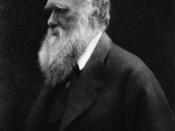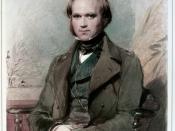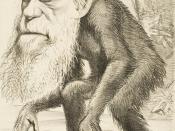It is commonly thought today that the theory of evolution originated from Darwin in the
nineteenth century. However, the idea that species mutate over time has been around for a long
time in one form or another. Therefore, by Darwin's time the idea that species change from one
type into another was by no means new, but was rejected by most because the proponents of
evolution could not come up with a satisfactory mechanism that would explain this change.
The most influential evolutionary theories prior to Darwin were those of Lamarck and
Geoffroy St. Hilaire, developed between 1794 and 1830. Lamarck suggested that species evolve
through the use or disuse of particular organs. In the classic example a giraffe that stretches its
neck slightly to reach higher leaves will gain in neck length, and this small gain would be passed
on to its offspring. Geoffroy, on the other hand suggested that the change was discontinuous,
large in magnitude, and occurred at the production of offspring.
However, these theories of
evolution were based on a priori explanations that offered no demonstrated mechanism.
Darwin's theory of evolution differs in that it is based on three easily verified observations.
First, individuals within a species vary from one another in morphology, physiology, and
behavior. Second, variation is in some part heritable so that variant forms have offspring that
resemble them. Third, different variants leave different number of offspring. Darwin than
proceeded to elaborate on the mechanism of evolution by suggesting that in the universal struggle
for life, nature selects those individuals who are best suited (fittest) for the struggle, and these
individuals in turn reproduce more than those who are less fit, thus changing the composition of
the population. In addition to natural selection, Darwin also suggested that species also evolve
through the complementary...



This essay copied from the book
i am 10th grade stundent. this essay is in my book. it copied by word to word .
he only changed the last part and said "Darwin has rightly earned his place in history as one of the giants of the scientific revolution."
This is the only part which is not copied
4 out of 4 people found this comment useful.